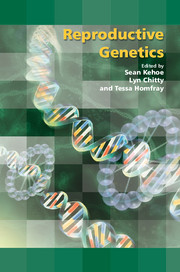Book contents
- Frontmatter
- Contents
- Participants
- Declarations of personal interest
- Preface
- 1 Genetic aetiology of infertility
- 2 Disorders of sex development
- 3 Preimplantation genetic diagnosis: current practice and future possibilities
- 4 Ethical aspects of saviour siblings: procreative reasons and the treatment of children
- 5 Epigenetics, assisted reproductive technologies and growth restriction
- 6 Fetal stem cell therapy
- 7 Prenatal gene therapy
- 8 Ethical aspects of stem cell therapy and gene therapy
- 9 Fetal dysmorphology: the role of the geneticist in the fetal medicine unit in targeting diagnostic tests
- 10 Fetal karyotyping: what should we be offering and how?
- 11 Non-invasive prenatal diagnosis: the future of prenatal genetic diagnosis?
- 12 Non-invasive prenatal diagnosis for fetal blood group status
- 13 Selective termination of pregnancy and preimplantation genetic diagnosis: some ethical issues in the interpretation of the legal criteria
- 14 Implementation and auditing of new genetics and tests: translating genetic tests into practice in the NHS
- 15 New advances in prenatal genetic testing: the parent perspective
- 16 Informed consent: what should we be doing?
- 17 Consensus views arising from the 57th Study Group: Reproductive Genetics
- Index
Preface
Published online by Cambridge University Press: 05 February 2014
- Frontmatter
- Contents
- Participants
- Declarations of personal interest
- Preface
- 1 Genetic aetiology of infertility
- 2 Disorders of sex development
- 3 Preimplantation genetic diagnosis: current practice and future possibilities
- 4 Ethical aspects of saviour siblings: procreative reasons and the treatment of children
- 5 Epigenetics, assisted reproductive technologies and growth restriction
- 6 Fetal stem cell therapy
- 7 Prenatal gene therapy
- 8 Ethical aspects of stem cell therapy and gene therapy
- 9 Fetal dysmorphology: the role of the geneticist in the fetal medicine unit in targeting diagnostic tests
- 10 Fetal karyotyping: what should we be offering and how?
- 11 Non-invasive prenatal diagnosis: the future of prenatal genetic diagnosis?
- 12 Non-invasive prenatal diagnosis for fetal blood group status
- 13 Selective termination of pregnancy and preimplantation genetic diagnosis: some ethical issues in the interpretation of the legal criteria
- 14 Implementation and auditing of new genetics and tests: translating genetic tests into practice in the NHS
- 15 New advances in prenatal genetic testing: the parent perspective
- 16 Informed consent: what should we be doing?
- 17 Consensus views arising from the 57th Study Group: Reproductive Genetics
- Index
Summary
Reproduction and genetics without doubt encompass a very wide remit and, as is often the case in Study Groups, it is not possible to cover all the aspects relating to the topic that would fulfil everyone's desires or aspirations. These constraints, however, do not prevent an attempt at addressing and discussing the relevant areas of the specialty with acknowledged experts from the UK and abroad.
The progress and increased knowledge base in genetics within the past decade have impacted on this important area with interesting consequences. The ability to identify genetic defects prior to implantation, to diagnose fetal abnormalities and to introduce screening programmes means that genetic testing has a major role in preventive medicine. In parallel with these advances, there are other aspects that cannot be ignored, such as education of the public and the potential ethical dilemmas that may arise by virtue of these new methodologies.
In this book, developed from the 57th RCOG Study Group, many of the above topics are discussed. It is hoped that the reader will find in a single book the diverse areas relating to reproduction and genetics, and it should be of interest to those involved in these specialist areas.
As with all these expert groups, the RCOG thanks all the individuals who have selflessly given their time and expertise to ensure the publication of a unique book covering areas not available elsewhere. My thanks go to the co-editors for their patience and to all the team involved in making this book a reality.
- Type
- Chapter
- Information
- Reproductive Genetics , pp. xi - xiiPublisher: Cambridge University PressPrint publication year: 2009
- 1
- Cited by



